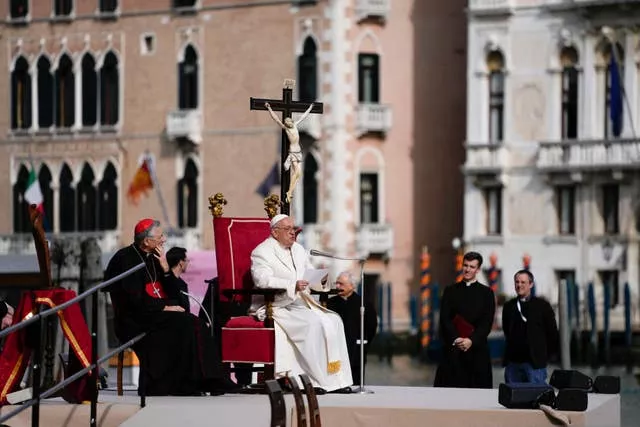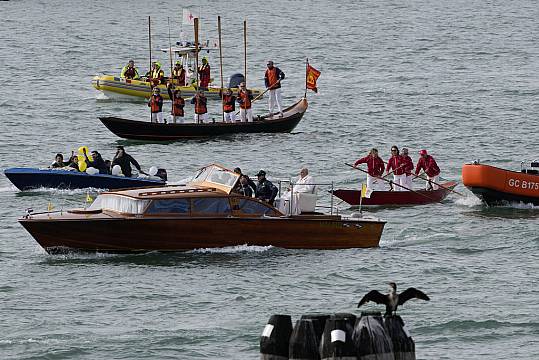The Pope has urged prisoners to view their time behind bars as a chance for “moral and material rebirth”, as he viewed an art show in a women’s jail in Venice.
Francis travelled to the lagoon city to visit the Holy See’s pavilion at the Biennale contemporary art show and meet with the people who created it.
Because the Vatican decided to mount its exhibit in the women’s prison, and invited inmates to collaborate with the artists, the whole project took on a far more complex meaning – touching on Francis’s belief in the power of art to uplift and unify, and of the need to give hope and solidarity to society’s most marginalised.
Francis hit on both messages during his visit, which began in the courtyard of Giudecca prison where he met with the women inmates one by one.

As some of them wept, Francis told them: “Paradoxically, a stay in prison can mark the beginning of something new, through the rediscovery of the unsuspected beauty in us and in others, as symbolised by the artistic event you are hosting and the project to which you actively contribute.”
Francis then met with Biennale artists in the prison chapel, decorated with an installation by Brazilian visual artist Sonia Gomes of objects dangling from the ceiling, meant to draw the viewer’s gaze upwards.
He urged the artists to embrace the Biennale’s theme this year of Strangers Everywhere, to show solidarity with all those on the margins.

“Art has the status of a ‘city of refuge’, a city that disobeys the regime of violence and discrimination in order to create forms of human belonging capable of recognising, including, protecting and embracing everyone,” Francis said.
The Vatican exhibit has turned the Giudecca prison, a former convent for reformed prostitutes, into one of the must-see attractions of this year’s Biennale, even though to see it visitors must reserve in advance and go through a security check.
It has become an unusual art world darling that greets visitors at the entrance with Maurizio Cattelan’s wall mural of two giant filthy feet, a work that recalls Caravaggio’s dirty feet or the feet that Francis washes each year in a Holy Thursday ritual that he routinely performs on prisoners.

Francis’s Sunday morning visit represented an increasingly rare outing for the 87-year-old, who has been endured health and mobility problems that have ruled out any foreign trips so far this year.
But it was also unusual because it came as Venice, sinking under rising sea levels and weighed down by the impact of over-tourism, is in the opening days of an experiment to try to limit the sort of day trips that Francis undertook on Sunday.
Venetian authorities last week launched a pilot programme to charge day-trippers 5 euro (£4.20) apiece on peak travel days. The aim is to encourage them to stay longer or come at off-peak times to cut down on crowds and make the city more liveable for its dwindling number of residents.
For Venice’s Catholic patriarch, Archbishop Francesco Moraglia, the new tax programme is a worthwhile experiment, a potential necessary evil to try to preserve Venice as a liveable city for visitors and residents alike.







